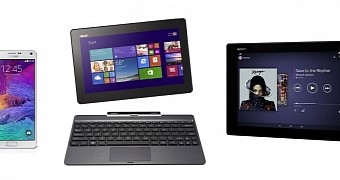Not so long ago, phones with large displays were considered pretty “niche,” but slowly customers have acquired a taste for them. So device manufacturers complied, and now more and more are releasing handsets with spacious screens.
Look at Apple, for instance, who last year instead of outing one iPhone model ended up releasing two models, including the iPhone 6 Plus which was meant to cater to the needs of the customers craving larger form factors.
While smartphones with bigger screens have been gaining marketshare lately, the fate of smaller tablets (7-inch to 10-inch) took a turn for the worse.
According to recent reports, tablet marketshare has been dropping consistently ever since 2013, but device manufacturers aren’t yet ready to say goodbye to tablets.
Hybrids will soon take over tablets
Most have re-oriented themselves towards hybrids or tablet/laptop convertibles, which are designed to offer the convenience of both. And I think these models have a better chance at putting a fight against phablets.
Hybrids come with Bluetooth keyboards, which attach to the tablet to offer a laptop experience. Third-party accessory manufacturers will often offer phablet-friendly keyboards too, but the larger form factor of these convertibles makes a case for them.
After all, getting productive on a phablet is still pretty complicated because one is still limited by the size of the phone’s display, which is not enough in some scenarios. But instead of owning a smartphone, a tablet and a laptop, a user can simplify things by opting to purchase only a handset and a hybrid.
Still, tablets will continue to co-exist with convertibles. Current hybrid models run Windows or Chrome OS and there's a big opportunity for expansion. Tech giants like Apple have yet to release something in this respect. Cupertino still relies on its iPads, and if we’re to give credit to the rumor mill, the company is prepping a new 12.9-inch device called the iPad Pro, which is bound to make an appearance soon.
Samsung hasn’t done anything in this sense either, but even if top device makers in the industry haven’t joined the hybrid bandwagon, I believe hybrids are here to stay. With Windows 10 on the horizon, interest in these models will certainly be boosted.
Windows 10 should put a fresh spin on things
Actually, at Computex 2015 in Taipei last week, a few of Microsoft’s partners already announced Windows 10 convertibles. One of them is Toshiba, who outed a pretty beastly device called the Astrea, which arrives with a 4K display, Intel’s next-gen Intel Skylake CPU, and Windows 10 out of the box. Definitely a product to watch out for, especially for high-end users.
However, tablets still have their supporters. They are usually more affordable than phablets (although in recent times we have seen really cheap models grace the market, like the Micromax Canvas Doodle 4) and there are still users out there who still cling onto a tablet for media consumption purposes, thus separating themselves from their computers.
Users who choose to purchase multiple devices (phablet, tablet, hybrid) might also be looking to experiment with alternate operating systems.
However, I think that people will slowly start moving away from tablets into the arms of hybrid devices.

 14 DAY TRIAL //
14 DAY TRIAL //